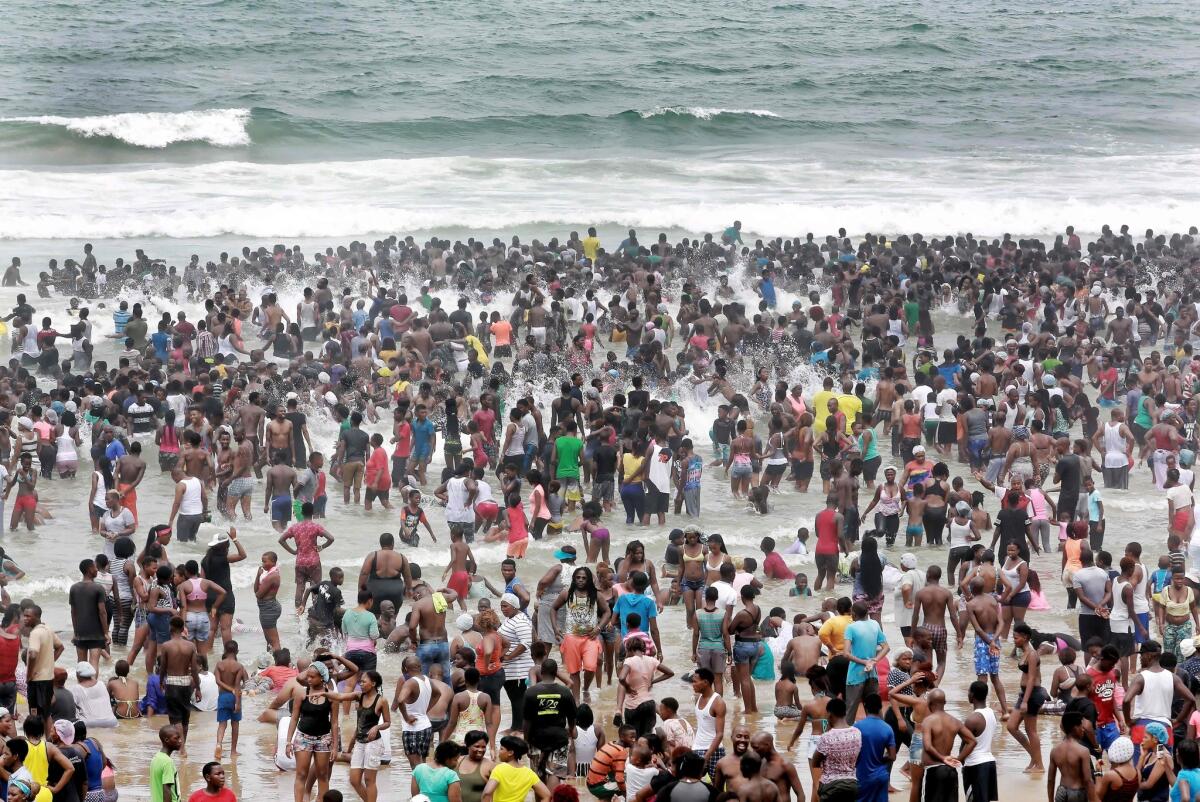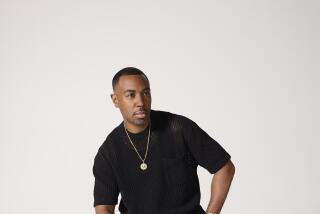Furor over racist tweet lays bare South Africa’s persistent divide

New Year’s revelers gather on the North Pier Beach in Durban, South Africa, on Jan. 1.
- Share via
Reporting from Johannesburg — Her name is Penny Sparrow and, over the course of two days, she went from being an anonymous South African real estate agent to perhaps the country’s most hated woman.
Sparrow ignited a social media storm when she posted a Facebook rant comparing black people to monkeys. The uproar has shone a spotlight into a deep racial divide more than two decades after South Africa scuttled the apartheid system that institutionalized racism.
And when Sparrow took to Facebook to apologize and local media to explain, she only made things worse.
Join the conversation on Facebook >>
Sparrow’s initial post Saturday insulted black people enjoying New Year’s Eve and New Year’s Day on the beaches in Durban, in South Africa’s east coast province, Kwa-Zulu Natal. Beaches were strictly segregated under apartheid.
“To allow them loose is inviting huge dirt and discomfort and troubles to others,” she wrote of black people.
Complaining about rubbish left on the beach, she wrote that she would “address the blacks of South Africa as monkeys as I see cute little wild monkeys do the same [sic] pick drop and litter.”
Sparrow posted an apology on Facebook saying the comments were “not meant to be a personal thing.” Her defense of the remarks Monday in an interview with a South African news site, News 24, only made things worse. Sparrow appeared sorrier to be at the center of a viral media storm than about the offense her comments caused. She also repeated the monkey comparison.
“I am sorry that it has taken such a viral turn, but it was just a statement of how it was,” she said. “I made the mistake of comparing them with monkeys. Monkeys are cute and they’re naughty.... I wasn’t being nasty or rude or horrible, but it’s just that they make a mess. It is just how they are.”
NEWSLETTER: Get the day’s top headlines from Times Editor Davan Maharaj >>
More than two decades after the end of apartheid, racist abuse on social media and online is so commonplace that several media outlets last year shut down the comments sections under news articles.
A survey last month by the Institute for Justice and Reconciliation found that 61.4% of South Africans felt that race relations since the end of white minority rule in 1994 had either remained the same or deteriorated. More than 60% said they experienced racism in their daily lives and more than 67% said they had little or no trust in people of other racial groups.
(By comparison, in a CNN-Kaiser Family Foundation poll released in November, 49% of Americans -- and 66% of African Americans -- said that racism remains a big problem in the United States. Roughly one-quarter of the African Americans surveyed said they had been subjected to racial discrimination in the previous 30 days.)
Thirteen percent of black South Africans surveyed said they experienced racism all or most of the time.
According to the survey, most interaction between people of different racial groups occurs in public spaces like workplaces, educational institutions, shopping malls and similar spaces.
“Interaction in more intimate spaces, such as private homes and social or communal gatherings, is limited,” the institute found.
Also Monday, South Africa’s Standard Bank suspended a prominent economist, Chris Hart, over a weekend tweet that the bank said had “racist undertones.”
Hart had tweeted that 25 years after apartheid, its victims now have “a sense of entitlement and hatred towards minorities.” In South Africa, “minorities” refers to anyone who is not part of the black majority.
Standard Bank tweeted Monday that the comments were factually incorrect and didn’t reflect the bank’s values. It instituted an internal disciplinary hearing.
But it was Sparrow’s tweet that really ignited a firestorm.
Sparrow was a member of the country’s main opposition party, the Democratic Alliance, which reacted strongly to her comments. The party condemned the remarks, announced it would suspend her, and formally sought criminal charges against her for “crimen injuria,” the crime of hurting someone’s dignity through racist or obscene language. Police opened a criminal investigation against her.
“Racists are not welcome in the DA, and have no place in our democratic South African society,” the party said in a statement.
The scandal came several months after the Democratic Alliance expelled a prominent party member, Dianne Kohler Barnard, for sharing a Facebook post that begged the white apartheid era leader P.W. Botha to come back because “you were far more honest than any of these rogues, and you provided a far better service to the public.”
Kohler Barnard, a lawmaker and the party’s spokeswomen on police, claimed she didn’t read the full post before sharing it. She appealed the expulsion and was readmitted to the party last month.
Follow @RobynDixon_LAT for news from Africa.
ALSO
A mayor in Mexico is shot dead a day after taking office
A cry for help in India’s Bihar state: ‘We need a toilet desperately’
Mideast rift widens as Saudi Arabia allies cut ties with Iran
More to Read
Sign up for Essential California
The most important California stories and recommendations in your inbox every morning.
You may occasionally receive promotional content from the Los Angeles Times.










